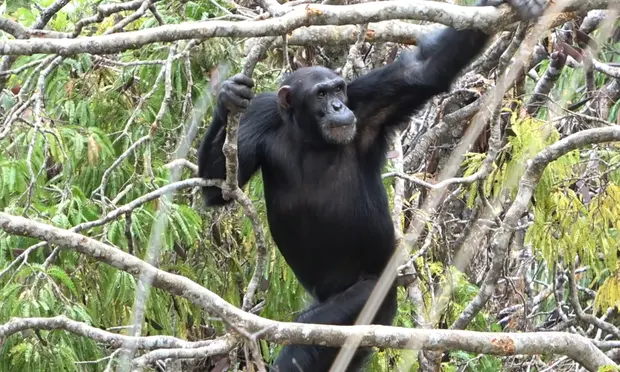Walking on two legs may not have been linked to environmental shifts, as previously thought

An adult male chimpanzee walks upright to navigate flexible branches in the open canopy, in behaviour characteristic of the Issa Valley savanna-mosaic habitat. Photograph: Rhianna Drummond-Clarke
The ancestors of humans may have begun moving on two legs to forage for food among the treetops in open habitat, researchers have suggested, contradicting the idea that the behaviour arose as an adaptation to spending more time on the ground.
The origins of bipedalism in hominins around 7m years ago has long been thought to be linked to a shift in environment, when dense forests began to give way to more open woodland and grassland habitats. In such conditions, it has been argued, our ancestors would have spent more time on the ground than in the trees, and been able to move more efficiently on two legs.
But now researchers studying chimpanzees in Tanzania say that trait may have different origins. “I think we have long told this very logical story, that at least our data don’t really support,” said Dr Alex Piel, a biological anthropologist at University College London and a co-author of the research.
Writing in the journal Science Advances, the researchers report how they spent 15 months studying 13 chimpanzees living in Issa Valley in western Tanzania, an environment similar to that experienced by our ancient ancestors.
The results reveal that these chimpanzees spent a greater proportion of their time on the ground, and in movement, when in an open environment of woodland and grasses than in densely forested parts of the same area.
However, even in the open environment, the proportion of time the chimpanzees spent on the ground was similar to that previously recorded for other populations of the apes living in densely forested areas, including Gombe and Mahale.
“Even though we have far fewer trees, [the chimps are] no more terrestrial,” said Piel.
The team then combined the data for the different environments in Issa Valley and analysed how often the chimpanzees either stood or moved on two feet.
The results reveal that while bipedal behaviour accounted for less than 1% of recorded postures, only 14% related to chimpanzees on the ground.
“Most of the time that they are on two legs is in the trees,” said Piel, adding that the behaviour, at least amid the branches, appears to be most commonly linked to foraging for food.
Rhianna Drummond-Clarke, first author of the research from the University of Kent, said that open woodland could favour bipedalism in chimpanzees, and by extension early human ancestors, because such environments have more sparsely distributed trees than dense forests.
“[Bipedalism may help them] safely and effectively navigate the flexible branches and access as many fruits as possible when they find them,” she said.
The team says that while the study cannot prove that our human ancestors showed the same patterns of bipedal behaviour, it calls into question common assumptions of how humans ended up walking on two legs, and suggests that trees continued to play a role in our evolutionary story even as the environment shifted.
“Rather than time on the ground stimulating [bipedalism], it may have catalysed it, but it was already there,” said Piel. “And that fits perfectly with the fossil record because all the all these early hominins have both arboreal and terrestrial adaptations.”
… we have a small favour to ask. Millions are turning to the Guardian for open, independent, quality news every day, and readers in 180 countries around the world now support us financially.
We believe everyone deserves access to information that’s grounded in science and truth, and analysis rooted in authority and integrity. That’s why we made a different choice: to keep our reporting open for all readers, regardless of where they live or what they can afford to pay. This means more people can be better informed, united, and inspired to take meaningful action.
In these perilous times, a truth-seeking global news organisation like the Guardian is essential. We have no shareholders or billionaire owner, meaning our journalism is free from commercial and political influence – this makes us different. When it’s never been more important, our independence allows us to fearlessly investigate, challenge and expose those in power. Support the Guardian from as little as $1 – it only takes a minute. If you can, please consider supporting us with a regular amount each month. Thank you.







Leave a Comment
You must be logged in to post a comment.